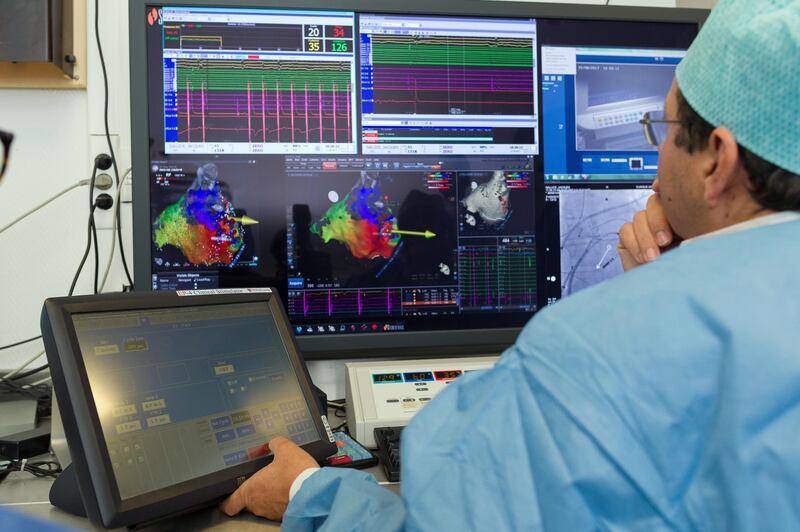Luxurious lifestyles and a dependence on outside help for daily tasks are contributing to an obesity crisis among young people in the UAE, doctors said.
Speaking during Heart Awareness Month, doctors at Cleveland Clinic Abu Dhabi said choosing convenience over self-reliance is stopping people from moving around enough.
"Luxury is killing the younger population here," said Dr Gurjyot Bajwa, consultant cardiac surgeon at the hospital.
"Diabetes, morbid obesity, high blood pressure and heart disease [are] being seen in people at an average of 10 to 20 years younger than the western population. The lack of exercise, self-care or self-reliance is affecting their health."
Dr Bajwa said many domestic chores could be a source of exercise but were often performed by outside help.
Among the leading causes of heart disease is obesity. It is also linked to diabetes and high cholesterol.
Dr Bajwa said doctors have reported an increase in young patients suffering from heart disease with children as young as 14 having it diagnosed.

The hospital commissioned a survey of more than 1,000 UAE residents as part of its World Heart Day Campaign. Up to 21 per cent of the respondents reported being obese and 35 per cent said they did not exercise enough. About 18 per cent of them said they would consider weight-loss surgery to improve their heart health.
Dr Bajwa said part of the problem was ensuring people knew what signs to look for.
"We struggle with awareness at the grass-roots level, to let people know that if you are short of breath, if you feel fatigued when you shouldn't be, if you are gaining weight, seek help sooner rather than later," she said. "This help is accessible but the mindset is that you need to see a specialist and sometimes they will travel to see a cardiac surgeon when all they need is a regular doctor to manage their blood pressure."
UAE health officials have made efforts to encourage residents to visit general practitioners first instead of consultants or specialists.
Primary healthcare centres have been opened across the country to encourage regular visits to GPs but few patients go, meaning diseases are often diagnosed late.
"There are gaps in the healthcare system," Dr Bajwa said.
“One is the gap in consistency of care with patients who go doctor shopping – sometimes going to three doctors for a second and third opinion.”
For now, doctors are attempting to stave off some of these diseases by tackling the source: obesity.
Dr Matthew Kroh, general surgeon and chair of the digestive diseases institute at CCAD, has conducted thousands of bariatric surgeries in the US and the UAE.
“One of the best ways to have healthy heart is to avoid obesity and the most guaranteed way for weight loss is bariatric surgery,” he said.
Last year, more than 300 bariatric surgeries were performed at the hospital. This year, they are on track for 450. People are becoming increasingly aware that bariatric surgery is safe and very effective, Dr Kroh said.
He said the biggest misconception about bariatric surgery was that it is only about weight loss or is cosmetic.
“We are really affecting people’s lives by curing them of many of the problems that they are suffering from, such as diabetes and high cholesterol,” Dr Kroh said.
Their youngest bariatric surgery patient was 15 years old. Two thirds of their patients are women between 35 and 50.
Fewer than 1 per cent of eligible patients in the US undergo bariatric surgery, Dr Kroh said. He estimated that the percentage in the UAE was much higher but said exact figures were not available.
"The main difference in the UAE is that people are not as obese but they have higher disease burdens, meaning that at lower weight, people in the UAE are more likely to have diabetes, high cholesterol and high blood pressure, and that is different in the US where patients tend to be bigger but less sick."
He believes that there is a genetic component with people in the UAE more prone to having central obesity, which is associated with diabetes and heart disease.
“It is more of a medical burden,” he said, “and puts them at risk of long-term complications such as strokes and heart attacks.”






